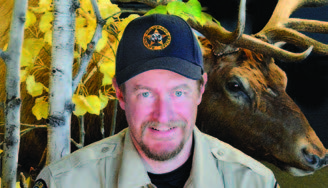Aaron Berscheid is a district wildlife officer for Colorado Parks and Wildlife. Aaron covers the “wild” side of Northeast El Paso County, including Black Forest, Falcon, Peyton and Calhan. He also covers some of Elbert County, north of U.S. Highway 24 and south of State Highway 86, including the towns of Elbert, Kiowa, Ramah, Simla, Matheson and a small portion of the Limon area.
Become “Bear Aware” to keep them alive
By Aaron Berscheid
District Wildlife Manager, CPW
It’s summer and that means it’s time to talk about bears. They always show up when we least expect them to, and it is always an encounter that leaves an impression.
Bear sightings are the absolute most common interaction people experience. And most of the sightings are from security cameras and doorbell cameras.
For many, it’s a revelation to learn that bears roam their neighborhoods, and they are excited to simply see them on video as they wander around their homes.
It’s even more exciting to see them in person. Let’s face it, bears are cool animals to look at and watch, and to have a personal sighting of a bear is an awesome experience.
For people living in the Black Forest area, these are common-place encounters. And they are nothing to worry about as long as the bear did not damage anything around your house or property.
However, if your bear encounter is more than just a simple sighting, we need to examine the cause.
If a bear tore into a trash can or a bird feeder or a barbecue grill or ate dog food left outside, then we as humans have a lot of responsibility for this behavior.
Bear behavior can be described with this simple description: a bear is a stomach with a nose. When a bear is not resting, it is looking for food. And like most wildlife, they are going to look for the easiest meal possible. If we as humans haphazardly leave food sources available for bears, we can be the blame for big problems, even serious conflicts. And the bear is going to lose.
Once a bear is accustomed to human food sources, it will associate humans with food. This leads to further interactions with humans and a higher likelihood of the bear getting more comfortable around humans.
Bears are naturally afraid of humans and I want to keep it that way.
Quite frankly, it’s much safer for the bears, too. If a bear becomes habituated to human food sources, it will get more and more aggressive pursuing that easy food. It is only a matter of time that it does something that cannot be tolerated. Behaviors that cannot be tolerated from a bear are aggression, entering into a dwelling and depredation on livestock.
What does this mean for a bear? Unfortunately, if a bear exhibits a behavior that is dangerous to human health and safety, Colorado Parks and Wildlife cannot relocate it. It must be euthanized.
What does this mean for humans? It is really up to us! We are the ones in control!
This is why CPW preaches the importance of humans being responsible around bears.
Please be “Bear Aware” and follow these simple guidelines:
- Only put your trash out the morning of pickup, as close to pickup as possible.
- Store BBQ grills in a locked location, or clean them after every use.
- Feed pets inside, and keep all stored pet food inside.
- Close and lock all doors and windows accessible to a bear (even ones accessible by decks).
- Do not leave any food sources in vehicles (bears are clever and will open car doors).
- Do not have bird feeders accessible to bears (bears love bird seed and sugar water).
- For people with chickens, goats, beehives, cows and other livestock, take action to protect your animals. Electric fencing is their best protection.
Lastly, report all bear encounters, from sightings to anything else. This is the best way to avoid negative interactions with bears.
CPW records all bear activity reported to us. This allows us to track bear activity almost in real time. That’s important because the data allows us to identify problems before they become intolerable. We can intervene with bears that are becoming too habituated to humans before it’s too late.
In the coming months, I’ll share more stories as I write about wildlife issues in our community. Got a question, problem or column idea? Please email me at aaron.berscheid@state.co.us or call me at 719-227-5231.
I might even answer your question in a future installment of “Wildlife Matters.”




